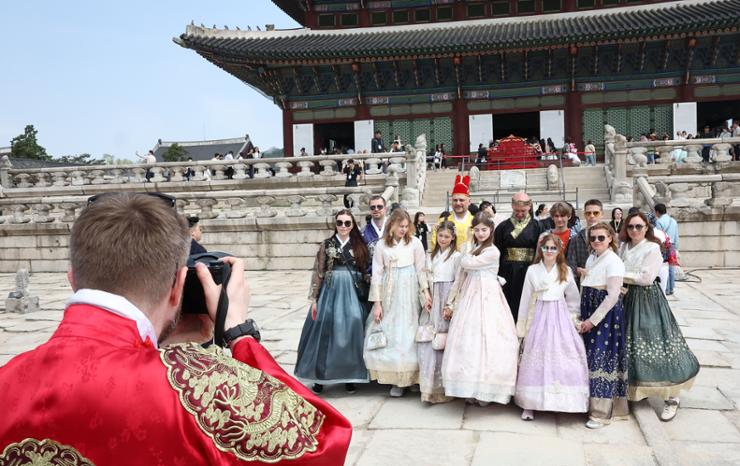
Foreign tourists wearing hanbok (traditional Korean clothing) pose for a group photo at Gyeongbokgung Palace in central Seoul on Wednesday.United
Written by Kwak Young-soo
Foreign tourists visiting South Korea are least satisfied with their shopping and taxi ride experiences, a report by the Korea Tourism Organization (KTO) revealed on Sunday.
According to the KTO, the Tourism Complaint Center received 902 complaints last year, a significant increase compared to 288 in 2022.
According to the report, the number of complaints decreased from 2020 to 2022 during the COVID-19 pandemic, but increased last year as the tourism industry recovered.
Of the complaints, 808 (89.6%) were made by foreign tourists.
The highest number of complaints (215) were related to shopping, including price gouging, tax refunds, and refund and exchange policies.
“I saw the combined price of 8,000 won and bought a set of 10 foot masks, but later I realized that I had been charged 80,000 won.When I requested a cancellation, the store manager said he was unable to work and asked me to come the next day. “It doesn’t exist,” KTO reported a Japanese tourist as saying.
Taxi service was the second most inconvenient point for foreign tourists, accounting for 18.8% (170 complaints). Problems included overcharging, refusing to turn on the meter, drivers being disrespectful to customers, and intentionally driving long distances in search of higher fares.
The Jeju Special Self-governing Police Agency announced Thursday that it has busted a taxi driver who tried to charge Chinese tourists an exorbitant fare for a ride from Jeju International Airport to a hotel near Hamdeok Beach.
According to the police, the taxi driver was ordered to return 177,000 won because he received 200,000 won when the taxi fare was supposed to be 23,000 won.
Complaints regarding accommodation facilities ranked third.
Of the 142 cases reported, 31.7% were related to poor facilities and hygiene.
KTO and the Ministry of Culture, Sports and Tourism pledged to cooperate with local governments to improve convenience for tourists and foster regional tourism.
In its report, the KTO said it would “regularly inspect major tourist attractions to monitor exorbitant pricing at cultural and tourism festivals. Tougher measures will be taken against illegal activities by taxi drivers.” We will take measures to improve services for foreign tourists.”
The number of tourists visiting Japan last year reached 11.02 million, an increase of 245% from the previous year. The number of people decreased significantly from 17.5 million in 2019 to 2.52 million in 2020 and 970,000 in 2021, but recovered to 3.2 million in 2022 and exceeded 11 million last year.

